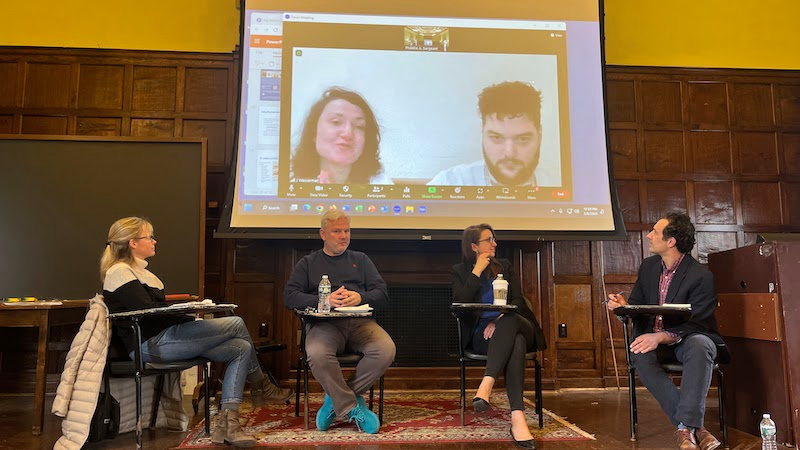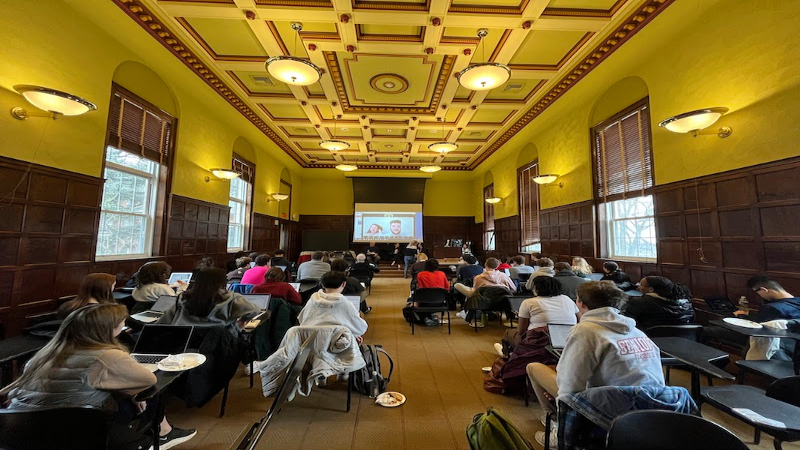
Tufts Political Science Department Panel Discussion on “One Year of the Russia-Ukraine War”
By Hannah Campeanu, MALD 2024 Candidate, The Fletcher School
On March 8, 2023, the Tufts University Department of Political Science hosted the panel “One Year of the Russia-Ukraine War: Assessing the Impact and Looking to the Future” on the social, cultural, and humanitarian impact of the War in Ukraine. The panelists included Tufts University professors Oxana Shevel and Alice Sullivan, visiting professor Volodymyr Dubovyk, and Tufts alum Joel Wasserman.
Professor Alice Sullivan opened the panel with a discussion of art history in Ukraine and the cultural preservation efforts that have been going on there since the war began.
Professor Oxana Shevel, who is Ukrainian, took the opportunity to provide a more political perspective on the past year of war. She recounted how she and many other scholars were initially skeptical that Russia would invade Ukraine despite the warnings from the U.S. intelligence community, because Putin’s goals in invading seemed so ludicrous. She also observed that Putin seems to have come to believe his own identity-based propaganda that Ukraine is not an independent country. Shevel said that there is no room for Ukraine to compromise and that she doesn’t see a path to victory for Russia, even though the current situation on the ground may stay as it is for a long time. She questioned how resilient the Russian regime would be in the face of a new Ukrainian counteroffensive, suggesting it may trigger some change we can’t predict right now.

She noted, “I was in a panel yesterday as an audience member at the Davis Center at Harvard. Four foremost experts on Russia…admitted they don’t really know. They were asked for a percentage prediction of regime change in Russia in the next year. Do you know what the percentages were? 10%, 40%, 50%, and 100%.”
Visiting professor Volodymyr Dubovyk built on Shevel’s points, discussing the role of Western support Ukraine has played in the conflict. He stated that a new Ukrainian counteroffensive could help bolster U.S. willingness to send further support to the country. He recalled the importance of the U.S. intelligence community’s assistance in planning a response to the invasion in advance, and remarked on the support he has experienced from regular citizens in the United States. He also spoke about the ongoing need for economic and infrastructure support in Ukraine, noting that more than six million people lost their jobs, and that most cities and hospitals are run entirely on generators.

He also discussed the need for military support, saying “In Ukraine there is an attitude to the weapons supply from the West which is twofold. On the one hand, [we are] extremely grateful for the support, and on the other hand, people often question why there are delays, why there are these deliberations and hesitations. Why is it that often someone tells us you’re going to receive it tomorrow when we need it yesterday? We are paying a very high price…because Ukrainian people are dying.”
Finally, Joel Wasserman, a Class of 2015 Tufts alum, spoke about the humanitarian work he has done while living in Ukraine for the past several years. The event then concluded with time for audience questions.
